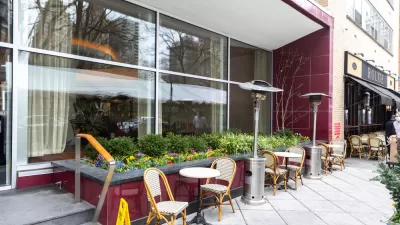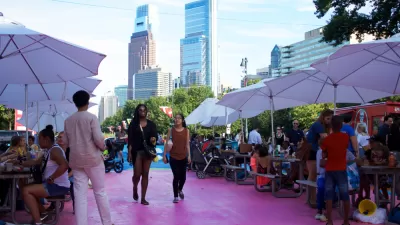Some restaurants have found ways to circumvent the expense of liquor licenses in Philadelphia by opening pop-up beer gardens operating under a much, much cheaper catering permit. Cue state legislation to curb the practice.
"A quartet of state lawmakers are pushing back on Philly's pop-up [beer] gardens, taking issue with something called an off-premise catering permit that allows vendors to 'cater' alcohol sales at these pop-up gardens for months at a time," reports Jon Geeting.
The key to the controversy is the Prohibition-era policy of county quotas, according to Geeting. "The state caps R licenses at 1 license per 3,000 people per county, and the number of licenses in Philadelphia has actually been declining as the population has grown, as many have been taken out of circulation due to liens and violations."
Washington D.C.'s liquor licenses sell for $9,000-11,000, so Philadelphia's $85,000 liquor licenses constitute a significant barrier to entry into the bar and restaurant business by comparison.
"That's what makes the pop-up beer gardens so innovative," explains Geeting, "a restaurant with a liquor license can obtain an off-site catering permit for $500 to extend that license to another location, and cater one of these temporary outdoor bars for a few months in the summer and fall. The legality of a single permit holder serving the same beer garden for months at a time is what state lawmakers are contesting…"
FULL STORY: The Prohibition-era policy driving the political scuffle over pop-up beer gardens

Alabama: Trump Terminates Settlements for Black Communities Harmed By Raw Sewage
Trump deemed the landmark civil rights agreement “illegal DEI and environmental justice policy.”

Planetizen Federal Action Tracker
A weekly monitor of how Trump’s orders and actions are impacting planners and planning in America.

Why Should We Subsidize Public Transportation?
Many public transit agencies face financial stress due to rising costs, declining fare revenue, and declining subsidies. Transit advocates must provide a strong business case for increasing public transit funding.

Understanding Road Diets
An explainer from Momentum highlights the advantages of reducing vehicle lanes in favor of more bike, transit, and pedestrian infrastructure.

New California Law Regulates Warehouse Pollution
A new law tightens building and emissions regulations for large distribution warehouses to mitigate air pollution and traffic in surrounding communities.

Phoenix Announces Opening Date for Light Rail Extension
The South Central extension will connect South Phoenix to downtown and other major hubs starting on June 7.
Urban Design for Planners 1: Software Tools
This six-course series explores essential urban design concepts using open source software and equips planners with the tools they need to participate fully in the urban design process.
Planning for Universal Design
Learn the tools for implementing Universal Design in planning regulations.
Caltrans
Smith Gee Studio
Institute for Housing and Urban Development Studies (IHS)
City of Grandview
Harvard GSD Executive Education
Toledo-Lucas County Plan Commissions
Salt Lake City
NYU Wagner Graduate School of Public Service




























